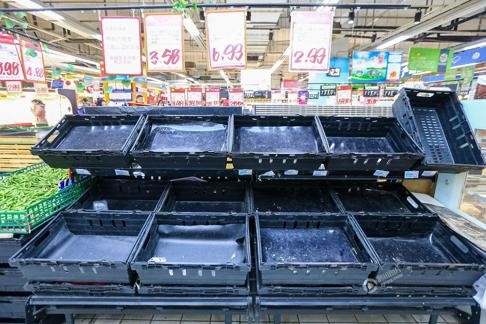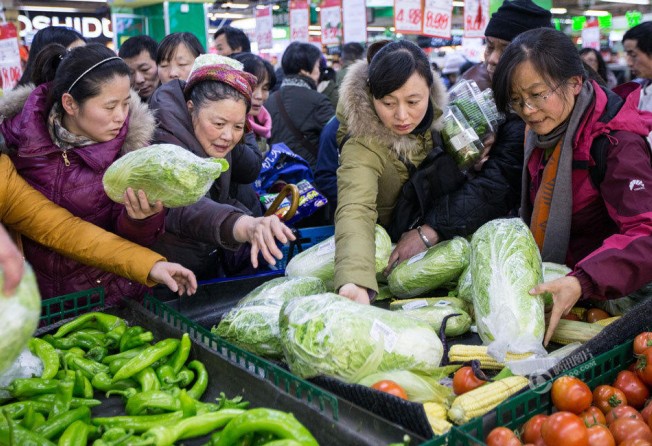
Incredible scenes as mainland shoppers strip supermarket shelves ahead of big chill

Residents across some mainland cities are frantically stocking up food in preparation for a front of very cold weather that has already caused traffic chaos and closed schools.
Temperatures in Yakeshi in Inner Mongolia (內蒙古) dropped to minus 28 degrees Celsius yesterday, while Harbin (哈爾濱) in Heilongjiang (黑龍江) province experienced minus 19 degrees.
Beijing is expecting minus 17 degrees on Saturday and the cold front is expected to head south.
The National Meteorological Centre predicted temperatures would drop by as much as 10 degrees across much of the country over the next four days and many local authorities have issued yellow alerts for the cold – the second highest on a four-level scale.
The cold front has come about after a warm current from Europe entered the North Pole region and drove the polar weather south at the end of last year. The vortex lingered over Russian Siberia before moving south to East Asia.
Long queues formed at vegetable and meat counters at a supermarket in Hefei (合肥), Anhui (安徽) province
Similar scenes were seen in Hangzhou (杭州), Zhejiang (浙江) province. Photographs showed shelves emptying and shoppers snatching at fresh produce.
In Shanghai, people were hoarding vegetables and meat to embrace the freeze, despite rocketing prices. Pork has surged from 14 yuan per 600 grams to 19 yuan.
“Food prices are so expensive. I spent a lot more buying vegetables and meat today,” said one woman, 66. “I have stocked up on food for three days as I won’t leave home these days.”
She said she had never experienced temperatures as low as minus 10 degrees in Shanghai. People in the city struggled more with the cold than those in the north because Shanghai was more humid, she said.
“Since I have got arthritis disease, I have to use the air conditioner for some hours of day. My electric bill this month will surge. My pension is not high and we are helpless.”
Shanghai residents have been told to store water in buckets and wrap outside water pipes with cloth to prevent them from freezing. People should avoid riding bicycles and drive slowly, the local government said.
Schools in Changsha (長沙), Hunan (湖南), closed early for the Lunar New Year holidays because of the cold weather, state news agency Xinhua reported. Schools in Changzhou (常州) also closed.
Hong Kong’s weather is expected to become significantly colder over the weekend when the cold surge reaches the Guangdong coast. Hong Kong weather authorities forecast temperatures would drop to eight degrees tomorrow, and six degrees on Sunday and Monday.
Despite having dismissed speculation of snow, the Observatory said there was a chance of ice or frost on high ground and in rural areas of the New Territories.
Clothing retailers and electrical appliance stores have seen sales boosted. Japan Home Centre said sales of heaters and electric blankets had surged by as much as 150 per cent.
Kindergartens are also preparing, with many allowing pupils to wear their own clothes.
Hong Kong’s Labour Department guidelines advises employers to make special arrangements for working during cold weather, such as rescheduling outdoor work.
In January 2008, China experienced its worst snowstorm in five decades, with much of the south ravaged by extreme weather for a month. The worst hit areas included Hunan, Guizhou (貴州), Hubei (湖北), Jiangxi (江西), Guangxi (廣西), Zhejiang, Anhui and Henan (河南) provinces.
The snowstorm caused widespread power outages and paralysed regional transport networks. At one point, nearly two million people were stranded on highways, train stations and at other transport terminals. The severe weather killed 107 people and caused more than 1.5 million yuan of damage.
Weather authorities said there would be less damage this time.
Flights from Hangzhou (杭州) to Guangzhou, Shenzhen, Zhuhai, Xiamen (廈門) and Nanning (南寧) were cancelled yesterday. Some high-speed rail sections in central and eastern China were shut down.